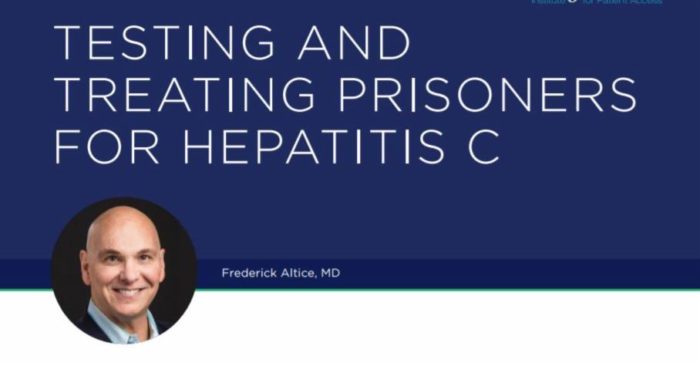IfPA Paper Weighs Access to Hepatitis C Cures for Prisoners
July 27, 2017
Nearly one in five Americans with hepatitis C spends time behind bars each year, making the prison system an opportune environment to test and cure potential transmitters of the disease. The move could benefit public health but, as a new policy brief from the Institute for Patient Access explains, several barriers stand in the way.

Authored by Frederick Altice, MD, “Testing and Treating Prisoners for Hepatitis C” doesn’t shy from an honest assessment of those barriers, which include:
- Cost. Treatment costs could strain government budgets. Direct-acting antiviral cures for hepatitis C cost thousands of dollars, though market forces have driven prices down considerably since the drugs became available in 2014.
- Public perception. Treating prisoners would benefit both individual patients and society at large, but the general public might rather see the funds go to more popular projects such as roads and schools.
- Staff and logistics. Prison systems may feel unequipped with the necessary medical staff to test and treat for hepatitis C.
Dr. Altice counters these reservations with several points:
- The upfront cost of treatment is offset by long-term reductions in health care spending for hepatitis C care such as liver transplants and treatment for liver cancer. To address immediate costs for treatment, prison systems may consider restructuring their health care spending or adjusting their spending priorities.
The paper also suggests negotiating with pharmaceutical companies to find a manageable price for treating the population.
- Despite public protest, treating prisoners with hepatitis C protects the public health interests of
the whole community. - Treatments, Dr. Altice explains, are “neither burdensome nor complicated” to provide.
The paper notes that jails often house inmates for a short period of time. So while they do not provide an ideal environment for treating hepatitis C, which takes eight-12 weeks, they present an opportunity for testing. Prisons are a more likely environment for treatment.
Under a U.S. Supreme Court ruling, Estelle v. Gamble, prisons are legally responsible for treating prisoners’ health conditions. But the protection sometimes works against patients with hepatitis C; prisons may hold back on testing detainees so they don’t make themselves legally liable to treat those whose tests yield a positive result. Several prisoners have had to take legal action to receive treatment, the paper notes.
Calling the availability of hepatitis C cures a “watershed moment for patients and health care providers,” Dr. Altice explains that policymakers must work toward solutions that make cures accessible for prisoners with hepatitis C and protect the larger public health interest.
For more, read “Testing and Treating Prisoners for Hepatitis C.”
Tags: Cost Value, HepatitisCategorized in: Blog

